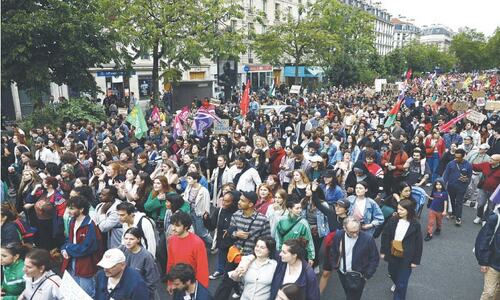AIN BAAL (Lebanon): For weeks Ali Nasser waited for the bomb disposal team. But the arrival of spring left him no choice but to go to his fields, sown last year by the Isreali military with hundreds of unexploded cluster bombs.
The alternative is to lose the tobacco crop which provides the means of feeding his 11 children, and which normally brings him $6,580 a year.
“How can I feed my family? I can’t wait, I must sow the crop,” said this farmer in south Lebanon where hundreds more like him face a daily gamble with death in their own fields.
The United Nations estimates that “about a million cluster bombs which did not explode” are scattered across south Lebanon where they have killed 30 people and wounded 187 since the 34-day war ended on last August 14.
But, said Nasser: “If I don’t deliver the tobacco to the state, I have no money. So I continue to work – each morning I go to the fields with my children.” Nasser, 54, found the first cluster bombs – bomblets enclosed in a larger bomb which scatter on impact – last year after the end of Israel’s offensive against Lebanon and Shia Hezbollah guerrillas.
“It was in August, seven days after the end of the war. I went with the whole family to our fields,” he recalled. “My daughter discovered them, one shaped like a ball, another with a ribbon, and one which resembled a telephone. She started laughing – she did not know what they were.” He went for help to the UN’s anti-mine coordination centre. “They came for a first time and told me they would return,” the farmer said, adding that nothing happened.
By September he was getting desperate to attend to his plants and, on the advice of a neighbour, approached a Palestinian living in a nearby camp.
“For $100 he worked for a whole day. He picked up bomblets and hurled them as far as he could so they exploded,” Nasser said.
“Others he collected using sticky paper and depositing them in a fruit crate on a layer of straw. The crate stayed there for three days and then disappeared with the contents.” Relieved, Nasser went back to working with his tractor in the fields on the edge of Ain Baal village, near the port city of Tyre.
But early in February, cluster bombs started to reappear. Three surfaced, while Nasser suspects others still lurk buried in the soil.
“I returned to the anti-mine centre. The next day they came, took the three away and told me ‘Don’t touch your land, we are going to return’ to clear it. I am still waiting,” he said.
At the anti-mine centre, spokeswoman Dalya Farran said 855 areas with unexploded bomblets had been listed, and added that “more than 100,000 of these devices” have been recovered by the 63 teams, civilian and military, working to made the region safe again.
But the controversial weapons have continued to claim victims such as 15-year-old Ahmad Naji, who had attended a school lecture on the dangers of the bomblets just two weeks before he lost his left foot.
“The cluster bomb was hidden under a stone. It exploded when I put my foot on it,” said the teenager, sitting at home in Batoulay village and wearing a gold medal he had earlier won for running, his favourite pastime.
The Food and Agriculture Organisation (FAO) has estimated that the Israeli offensive on Lebanon and the war with Hezbollah cost the country’s agricultural sector $280 million.
In the south, planted with tobacco and olive trees, the FAO says one quarter of cultivated land has been made unusable by unexploded munitions.
The United Nations has asked Israel for months – in vain – to tell it where the Jewish state’s aircraft unleashed their deadly cargoes.—AFP











































Dear visitor, the comments section is undergoing an overhaul and will return soon.